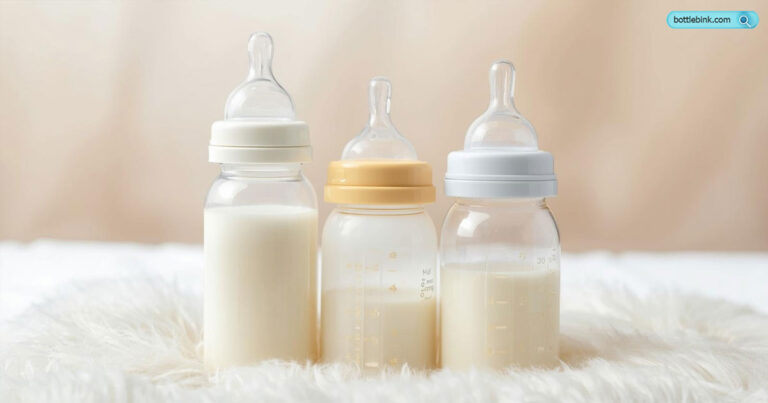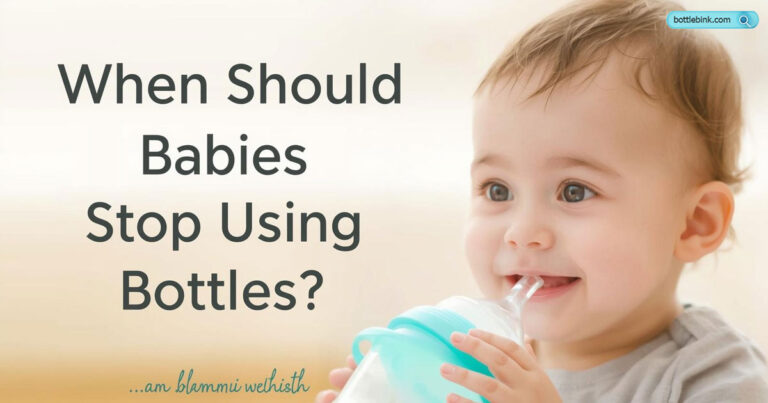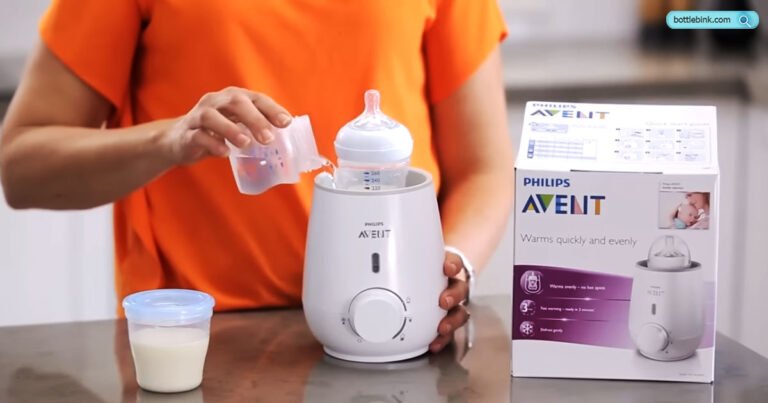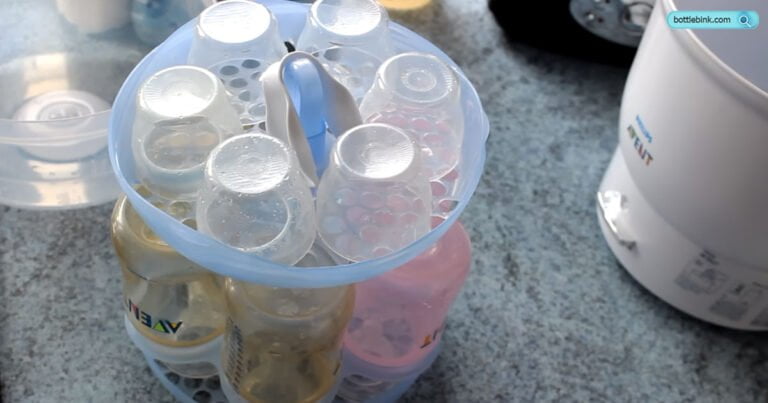When Do Babies Hold Their Own Bottle?
Most babies start holding their own bottle between 6 to 10 months old, but the timing can vary widely depending on each child’s development, coordination, and practice.
One of the sweetest milestones in a baby’s early development is when they begin to hold their own bottle. For parents, it’s not only a proud moment but also a sign that their little one is becoming more independent. However, it’s common for parents to wonder: When exactly do babies start holding their own bottles?
While some babies may reach this milestone as early as 6 months, others may take until 10 months or even a bit longer. Development is not a race, and every baby follows their unique timeline. This article will walk you through everything you need to know about when babies typically hold their own bottles, the signs of readiness, tips to encourage this milestone, safety considerations, and answers to frequently asked questions.
When Do Babies Hold Their Own Bottle? Typical Age Range
Most babies begin holding their own bottle between 6 and 10 months old. At this stage, they usually have the motor skills and hand strength needed to grip, lift, and control the bottle. However, not every child follows the same timeline. Some may hold it earlier, while others might not do so until closer to their first birthday.
Timeline Table: Bottle-Holding Development
| Baby’s Age | Development Stage | Bottle-Holding Possibility |
|---|---|---|
| 0–3 months | Newborn stage – learning to focus, weak grip | Not able to hold bottle |
| 4–5 months | Beginning to grasp toys and objects | Might try to touch or push the bottle |
| 6–7 months | Stronger arm and hand muscles, better coordination | Some babies begin holding bottles with help |
| 8–10 months | Improved motor skills, independence grows | Many babies can hold bottles alone |
| 11–12 months | Strong self-feeding skills | Bottle-holding becomes common |
Signs That Your Baby is Ready to Hold Their Bottle
Instead of focusing only on age, look for readiness signs.
Your baby can sit with support or balance in a highchair.
They grasp toys or objects with both hands.
They show interest in holding objects near their mouth.
They may push your hands away during feeding, wanting independence.
They attempt to move the bottle toward their mouth.
If you notice these signs, your little one may be ready to try holding their bottle.
Why Some Babies Hold Bottles Earlier or Later
It’s natural for parents to notice other babies holding their bottles and wonder why their little one hasn’t reached that stage yet. The truth is that babies develop at their own pace, and there is a wide range of what is considered “normal.” Several factors can explain why some babies hold bottles earlier while others take more time.
1. Genetics and Natural Development Speed
Just as some children walk earlier while others walk later, bottle-holding can also be influenced by a child’s genetic makeup. Some babies simply develop motor coordination and muscle strength more quickly than others. These differences don’t indicate intelligence or long-term abilities—they simply reflect each child’s natural growth pace.
2. Feeding Method: Breastfed vs. Bottle-Fed
The way a baby is primarily fed plays a big role. Babies who are bottle-fed regularly may become familiar with the shape and feel of a bottle earlier. They often practice grasping the bottle during daily feeds, which can speed up independence. On the other hand, breastfed babies may use bottles less frequently, so they might take longer to show interest in holding one on their own.
3. Muscle Strength and Motor Skills
Holding a bottle requires grip strength, coordination, and the ability to bring the object to the mouth. If a baby is still building arm and hand muscles, it may take more time. Babies who enjoy tummy time, reaching for toys, and practicing sitting often develop the strength needed sooner.
4. Frequency of Practice
Practice makes progress. Babies who are given the opportunity to touch, hold, and explore bottles during feeding sessions may master the skill earlier. On the other hand, if a parent prefers to always hold the bottle for their child, the baby might not get as much practice.
5. Baby’s Temperament and Personality
Personality plays a bigger role than many parents realize. Some babies are naturally more independent and eager to do things on their own, while others enjoy the comfort of being fed by a parent. Neither is better or worse—it simply reflects differences in temperament.
6. Prematurity or Health Factors
Premature babies or those with lower muscle tone may need more time to develop the strength required for bottle holding. While this can delay the milestone, it usually balances out as they grow. Pediatricians can provide guidance if there are concerns.
Encouraging Your Baby: Tips for Parents

As a parent, your role is to provide a supportive and encouraging environment. Here are some simple yet effective ways to help your baby on their journey to independent bottle-holding.
- Start with the Basics: Around 4-6 months, offer the bottle to your baby and gently place their hands on it. This simple act helps them associate the feeling of the bottle with feeding. You can do this even if they are not yet ready to hold it on their own.
- Provide the Right Support: When your baby is learning to sit up, use a baby chair or a pillow to provide them with the necessary back and head support. A stable posture will make it easier for them to use their hands for the task.
- Use the Right Bottle: Some bottles are easier for small hands to grasp than others. Bottles with a wide, ergonomic shape or those with handles are excellent options. You can also explore different bottle materials, such as silicone, which may offer a better grip.
- Practice with Toys: Encourage your baby to play with toys that promote fine motor skills. Soft blocks, rattles with handles, and textured balls are all great for strengthening their hand muscles. The more they practice grasping and holding, the more prepared they will be for the bottle.
- Be Patient and Positive: Avoid forcing the issue. If your baby resists holding the bottle, don’t make it a source of stress. Continue to feed them yourself and offer the opportunity to hold the bottle again at the next feeding. Your positive attitude is more important than the speed at which they learn.
- Safety First: It’s crucial to never prop a bottle. Propping a bottle can be a serious safety hazard, as it can lead to choking. It can also cause a condition known as “bottle mouth” or tooth decay. Always supervise your baby during feedings, even when they start to hold the bottle on their own. This supervision ensures they are not drinking too quickly or in a position that could lead to aspiration.
Safety Considerations While Baby Holds a Bottle
Although independence is exciting, safety should always come first.
Never Prop a Bottle – Leaving your baby alone with a bottle can lead to choking.
Avoid Bottle in Bed – Bottle-feeding in bed increases the risk of ear infections and tooth decay.
Supervise Feeding – Always stay close while your baby feeds themselves.
Switch to Cup Around 12 Months – Pediatricians recommend transitioning from bottle to sippy cup by one year to protect teeth.
For more details on safe bottle-feeding practices, the American Academy of Pediatrics provides helpful guidelines.
What If My Baby Isn’t Holding Their Bottle Yet?
It’s important to remember that late doesn’t mean abnormal. Some babies skip this milestone entirely and move straight to cups.
You might consider consulting a pediatrician if:
Your baby is over 12 months and shows delays in multiple motor skills.
There are additional concerns such as poor muscle strength or coordination.
Otherwise, it’s usually just a matter of time and practice.
Common Mistakes Parents Make
Parents are eager to see progress, but a few mistakes can slow down learning or cause problems.
Rushing the Milestone – Pushing before the baby is ready can frustrate them.
Using Heavy Bottles – Makes it difficult for babies to grip.
Feeding Without Supervision – Risk of choking increases.
Ignoring Readiness Cues – Every child develops differently; forcing may backfire.
Should You Be Worried if Your Baby Isn’t Holding Their Bottle Yet?
Not necessarily. Some babies may skip holding a bottle altogether if they quickly transition to a sippy cup. If your baby is between 10–12 months and still isn’t showing interest in holding the bottle, discuss it with your pediatrician. Often, it’s just a matter of timing, but sometimes developmental delays may need extra support.
Transitioning From Bottle to Cup
Around 12 months, many babies are encouraged to transition from bottles to cups. Holding their own bottle is a helpful step, but the final goal is self-feeding with cups.
Start with training cups or sippy cups.
Gradually replace bottle feeds with cup feeds.
Encourage drinking water or milk during meals in a cup.
This transition supports oral health, independence, and coordination.
Expert Tips from Pediatricians
Pediatricians often remind parents that baby milestones, including holding a bottle, are not strict deadlines but gentle guidelines. Every child develops at a unique pace, and comparing your baby to others can cause unnecessary stress. Below are expert-backed tips that can help you support your baby’s growth while keeping feeding safe and enjoyable.
1. Don’t Rush the Milestone
Doctors emphasize that rushing a baby into holding a bottle before they are ready can cause frustration. Babies under 6 months generally do not have the motor coordination needed for safe self-feeding. Instead of focusing on age, watch for readiness cues such as improved hand-eye coordination or your baby trying to grab the bottle during feeding.
Tip from pediatricians: Let your baby lead the process. Pushing too early often leads to more fussiness rather than faster learning.
2. Offer Lightweight and Easy-to-Grip Bottles
The design of the bottle can make a big difference. Pediatricians recommend bottles that are lightweight and have a slim neck or handles, making them easier for tiny hands to hold. Heavy or wide bottles may discourage your baby from trying.
Tip from pediatricians: Experiment with different bottle styles to see which one your baby finds easiest to grasp.
3. Encourage Practice During Feeding
Babies learn best by repetition. Pediatricians advise parents to gently guide the baby’s hands to the bottle during feeding sessions. Allowing your baby to touch and push the bottle helps them build familiarity and eventually the confidence to hold it alone.
Tip from pediatricians: Practice in short, relaxed sessions. If your baby resists, don’t force it—try again another time.
4. Always Prioritize Safety
Even as babies start to hold their bottles, safety comes first. Pediatricians strongly discourage bottle propping, as it can increase the risks of choking, overfeeding, and ear infections. Feeding should always be a supervised activity, even when your baby becomes more independent.
Tip from pediatricians: If your baby is holding their bottle, always keep a close eye and ensure they are seated in a semi-upright position.
5. Focus on Bonding, Not Just Independence
While it’s exciting to see your child gaining independence, feeding time is also about connection. Pediatricians stress the importance of continuing to hold and cuddle your baby during feeds. Emotional bonding and eye contact remain just as important as physical development.
Tip from pediatricians: Mix independence with closeness—let your baby hold the bottle while still sitting in your arms.
6. Watch the Bigger Picture of Development
Bottle holding is only one piece of your baby’s growth. Pediatricians advise parents to look at the bigger picture: is your baby meeting other milestones like rolling, sitting, or grasping toys? If so, there’s usually no reason for concern, even if bottle holding happens later.
Tip from pediatricians: Trust your instincts, but also consult your doctor if you notice consistent delays across multiple milestones.
7. Plan for the Next Stage
Doctors often remind parents that holding a bottle is not the end goal. Around 12 months, babies should begin transitioning from bottles to sippy cups or straw cups to promote oral health and prevent tooth decay.
Tip from pediatricians: Celebrate the milestone, but also prepare for the transition to cups to support healthy growth.
Frequently Asked Questions About Babies Holding Bottles
1. At what age do babies usually hold their own bottle?
Most babies start holding their own bottle between 6–10 months.
2. Is it bad if my baby holds the bottle too early?
No. If your baby shows readiness, it’s natural. Just supervise to prevent choking.
3. Can propping a bottle help my baby learn?
No. Bottle propping is unsafe and may lead to choking or ear infections.
4. Should I worry if my 9-month-old doesn’t hold the bottle?
Not always. Some babies take longer, and others may prefer transitioning directly to cups.
5. How can I encourage my baby to hold the bottle?
Offer lightweight bottles, guide their hands, and let them practice without pressure.
6. Does holding the bottle mean my baby is ready for solid foods?
Not necessarily. Bottle-holding is about motor skills, while solids depend on other readiness cues.
7. Can my baby sleep with a bottle?
It’s unsafe. It can cause choking and tooth decay.
8. What if my baby only holds the bottle for a short time?
That’s normal. Holding the bottle for longer will come with practice and strength.
9. Should I use bottles with handles?
Yes. They make it easier for babies to grip and encourage independence.
10. When should I switch to a sippy cup?
Experts recommend transitioning around 12 months.
Conclusion / Final Words
Watching your baby grow into independence is one of the most rewarding experiences of parenthood. Holding a bottle might seem like a small step, but it is a major developmental milestone that shows your child’s growing strength, coordination, and self-feeding ability.
Remember, babies usually hold their bottles between 6 and 10 months, but timing varies. Instead of worrying about the exact age, focus on providing encouragement, safe practice, and lots of love. And when your little one finally grabs that bottle on their own, you’ll know that another beautiful milestone has been reached.






